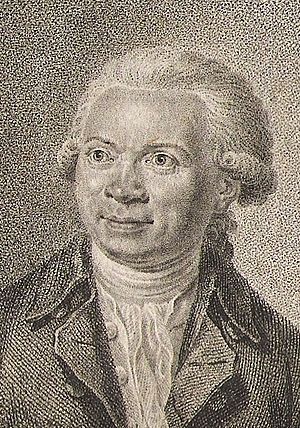Johann Abraham Peter Schulz facts for kids
Johann Abraham Peter Schulz (born March 31, 1747, in Lüneburg – died June 10, 1800, in Schwedt) was a German musician and composer. He is most famous for writing the music for several well-known songs. These include "Der Mond ist aufgegangen" and "Wir pflügen und wir streuen" (poems by Matthias Claudius), and the popular Christmas carol "Ihr Kinderlein kommet".
Contents
Schulz's Life Story
Johann Abraham Peter Schulz went to school in Lüneburg when he was a boy, from 1757 to 1764. Later, he studied music in Berlin with a famous composer named Johann Kirnberger. After learning a lot, Schulz started teaching music himself in Berlin.
In 1768, his teacher helped him get a job working for a Polish princess. For three years, Schulz traveled all over Europe with her. This trip helped him discover many new musical ideas and styles.
Schulz held several important music jobs. He was a conductor at the French Theatre in Berlin from 1776 to 1780. From 1780 to 1787, he was the Kapellmeister (music director) for Prince Henry in Rheinsberg. After that, Schulz worked as the Court Kapellmeister in Copenhagen, Denmark, from 1787 to 1795. He then returned to Berlin.
What Kind of Music Did Schulz Write?
Schulz wrote many different kinds of music. He composed operas (musical plays), music for the stage, and large pieces for choirs and orchestras called oratorios and cantatas. He also wrote pieces for the piano and many folk songs.
Besides composing, Schulz also wrote about music. He wrote articles on music theory for a large book called Allgemeine Theorie der schönen Künste. This book was about different types of art.
Piano Music
Schulz wrote several pieces for the piano, including:
- Sechs Klavierstücke (Six Piano Pieces), Op. 1, 1778
- Sonata, Op. 2, 1778
Songs (Lieder)
He composed many songs, often called Lieder in German. Some of his collections include:
- Gesänge im Volkston (Songs in Folk Style), 1779
- Lieder im Volkston (Songs in Folk Style), published in 1782, 1785, and 1790.
- Chansons Italiennes (Italian Songs), 1782
Operas
Schulz wrote several operas and operettas, which are shorter, lighter operas. Some of his operas include:
- Clarissa, an operetta, first performed in Berlin in 1775
- La fée Urgèle, a musical comedy, 1782
- Aline, reine de Golconde, performed in Rheinsberg in 1787
- Høstgildet (The Harvest Festival), a Danish musical play, performed in Copenhagen in 1790
- Indtoget (The Entry), a Danish musical play, Copenhagen 1793
- Peters bryllup (Peter's Wedding), a Danish musical play, Copenhagen 1793
Music for Plays
He also wrote music to be used in plays, known as incidental music.
- Music for Athalie by Jean Racine, performed in Rheinsberg in 1785
Church Music
Schulz composed several pieces for church services, including:
- Maria und Johannes (Mary and John), 1788
- Kristi død (Christ's Death), 1792
- Des Erlösers letzte Stunde (The Redeemer's Last Hour), 1794
- 4 Hymns, written between 1791 and 1794
See also
 In Spanish: Johann Abraham Peter Schulz para niños
In Spanish: Johann Abraham Peter Schulz para niños
 | Percy Lavon Julian |
 | Katherine Johnson |
 | George Washington Carver |
 | Annie Easley |


